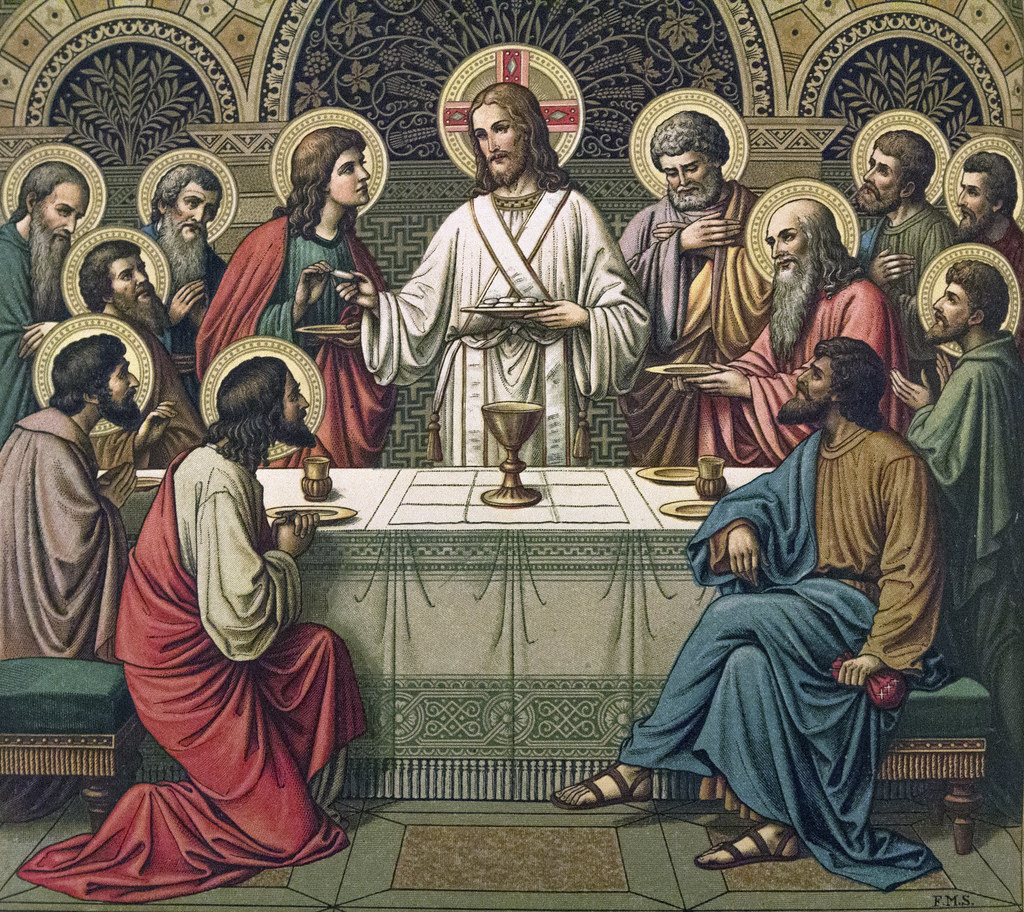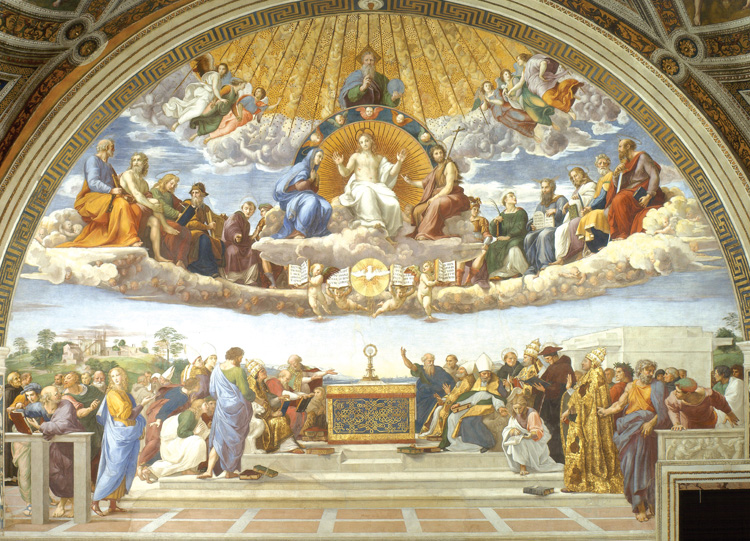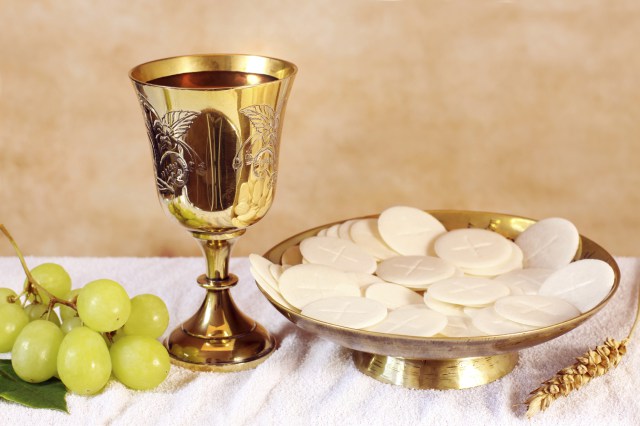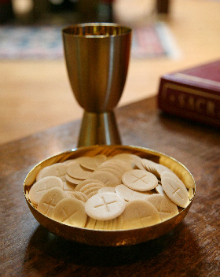“Give them some food yourselves.”
Perhaps the most distinctive aspect of Catholic worship is our celebration of the Eucharist. We state very strongly that it’s not just a symbol, not just a nice memory. It is the actual Body and Blood, Soul and Divinity of our Lord. We know that we are spiritually in the presence of our Lord whenever we receive Communion or adore the Blessed Sacrament. But even more, we believe that, in the Eucharist, we become what we receive: we become part of the Mystical Body of Christ, and in that Body we all become one. We Catholics believe that the Eucharist makes us one, and because of that, it is good for all of us to come together as one to celebrate this feast of the Most Holy Body and Blood of Christ.
On this feast of the Body and Blood of Christ, we are called to take comfort in the many ways God feeds us. We know that when we pray “give us this day our daily bread,” we will receive all that we need and more, because our God loves us and cares for us. But to really trust in God’s care can sometimes be a bit of a scary moment.
It was certainly scary for the disciples, who asked Jesus to “dismiss the crowds” so that they could go into the surrounding cities and get something to eat. They were afraid for the crowds because they had come to the desert, where there was nothing to eat or drink. They were afraid for the crowds because it would soon be dark and then it would be dangerous to travel into the surrounding cities to find refuge and sustenance. And, if they were to really admit it, they were afraid of the crowds, because all they had to offer them were five loaves of bread and two fish – not much of a meal for Jesus and the Twelve, let alone five thousand.
But Jesus isn’t having any of that. Fear is no match for God’s mercy and care and providence, so instead of dismissing the crowds, he tells the disciples to gather the people in groups of about fifty. Then he takes the disciples’ meager offering, with every intent of supplying whatever it lacked. He blesses their offerings, transforming them from an impoverished snack to a rich, nourishing meal. He breaks the bread, enabling all those present to partake of it, and finally he gives that meal to the crowd, filling their hungering bodies and souls with all that they need and then some. Caught in a deserted place with darkness encroaching and practically nothing to offer in the way of food, Jesus overcomes every obstacle and feeds the crowd with abundance. It’s no wonder they followed him to this out of the way place.
The disciples had to be amazed at this turn of events, and perhaps it was an occasion for them of coming to know Jesus and his ministry in a deeper way. They were fed not just physically by this meal, but they were fed in faith as well. In this miraculous meal, they came to know that Jesus could be depended on to keep them from danger and to transform the bleakest of moments into the most joyous of all festivals. But even as their faith moved to a deeper level, the challenge of that faith was cranked up a notch as well. “Give them some food yourselves,” Jesus said to them. Having been fed physically and spiritually by their Master, they were now charged with feeding others in the very same way.
“Give them some food yourselves.”
The Twelve certainly thought that was easier said than done, but how do we feel when we hear that command? Because, let’s be clear about this, it is a command for us as well. I just think this quote jumps off the page at me. Give them some food yourselves. Religious people often expect the proverbial deus ex machina, the “god out of the machine” that appears in some literary works when things go awry and sets everything right. God is expected to do all the heavy lifting while all we need to do is keep people in our thoughts and prayers. But that’s not how any of this works. The life of the disciple is not some contrived ancient drama, and God is not a literary device that we can employ when we’d rather not take care of people.
The way prayer works when we notice a need is that we ask God to help us to make the situation right. What can we ourselves do to make things right? The answer to that depends on our proximity to the problem, our station in life, and the resources we have. If we see a disaster in a far away place, like the wildfires in California earlier this year, our best effort might be to raise funds to assist those most in need, as we did for our Lenten Service Project this year, raising over $15,000 to assist those in the poorest areas of the LA Wildfires. But maybe we are a little closer, and we can go to a soup kitchen to provide a literal meal. Perhaps our situation gives us free time to go on a mission trip, bringing the love of Christ to those who need so much assistance. The list goes on. We need to take Jesus’ command to “give them some food yourselves” seriously, because he wasn’t just joking around.
Jesus has come to supply every need. In Jesus, nothing is lacking and no one suffers want. All the Lord asks of us each Sunday is to gather as a sacred assembly, to unite in offering worship with Jesus who is our High Priest, to receive Holy Communion, and then to go forth to share the abundance of our feast with others who have yet to be fed. After the crowd had eaten the meal, that was the time for them to go out into the surrounding villages and farms – not to find something to eat, but to share with everyone they met the abundance that they had been given. So it is for us. After we are fed in the Eucharist, we must then necessarily go forth in peace, glorifying the Lord by sharing our own abundance with every person we meet. We too must hear and answer those very challenging words of Jesus: “Give them some food yourselves.”
In our Eucharist today, the quiet time after Communion is our time to gather up the wicker baskets of our abundance, to reflect on what God has given us and done for us and done with us. We who receive the great meal of his own Body and Blood must be resolved to give from those wicker baskets in our day-to-day life, feeding all those people God has given us in our lives. We do all this, gathered as one in the Eucharist, in remembrance of Christ, proclaiming the death of the Lord until he comes again.
Give them some food yourselves.
Que el Cuerpo y la Sangre de Cristo nos mantengan seguros para la vida eterna. May the Body and Blood of Christ keep us all safe for eternal life.









You must be logged in to post a comment.